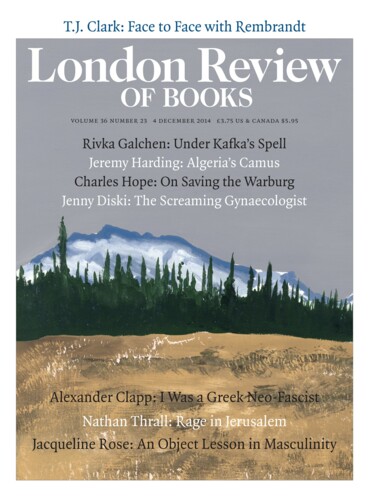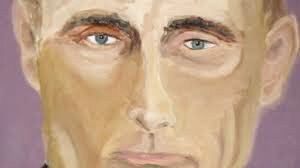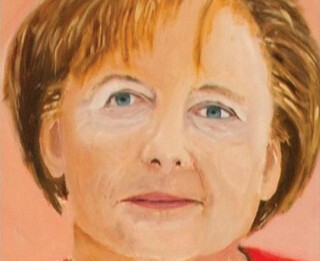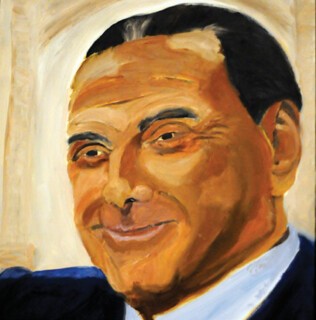It’s been five years and ten months. I confess to a bit of nostalgia for the nihilism that came with being governed by George W. Bush. For all the continuities, Obama arouses more earnest responses: apologetics, disappointment, head-shaking, Occupy, Edward Snowden. Bush’s arrogance has turned out to be that of a man destined to spend his golden years painting portraits of Putin, Merkel and Berlusconi like a dime-store Warhol working on commission for a UN theme bar. Retirement has now yielded a second book under his name.
Reviewers have welcomed 41: A Portrait of My Father like they miss father and son.* Or maybe it’s ‘the soft bigotry of low expectations’. ‘Bush’s conversational storytelling makes for engaging reading,’ Peter Baker writes in the New York Times. ‘It’s folksy, sharply observed and surprisingly affecting,’ Michiko Kakutani says in the same paper. ‘A helluva good read,’ Douglas Brinkley writes in the Financial Times. ‘Bush Jr’s new memoir doesn’t feel ghostwritten: his low-key Texas swagger permeates every page.’ Actually it gives every indication of being ghostwritten, and there was never much ‘low-key’ about George W. Bush. As with Decision Points (2010), the ghost is Chris Michel, who came by his folksiness via California and Yale, where he was a friend of Bush’s daughter Barbara before joining the White House speechwriting team in 2003 and rising through the ranks during the lame duck years. This time around the intended audience seems to be 11-year-olds of all ages. In the acknowledgments Bush calls Michel – or maybe Michel calls himself – ‘one of the great minds in our country’, though he’s not averse to dangling a participle here and there. His Bush narrator lacks the flair for malapropism and syntax mangling of the unscripted president. There are plenty of biblical quotations but no ‘evildoers’. Missing as well is the strained rhetoric of the solemn first-term teleprompter reader. ‘Terrorist attacks can shake the foundations of our biggest buildings, but they cannot touch the foundation of America,’ he said from the Oval Office on the night of 11 September 2001. ‘These acts shatter steel, but they cannot dent the steel of American resolve.’ Is that chiasmus?
The ‘yo, Blair’ voice is gone, but there’s something of the Bush style of saying you’re doing the opposite of what you’re really doing. ‘He never complained. Self-pity is not in George Bush’s DNA,’ we read on the first page. We’re also told that Dad never brags. What follows is a litany of boasts and grievances. The first string of feats: the Phi Beta Kappa key and star turn on the baseball team at Yale and the stint as a fighter pilot in the Second World War. His crash in the Pacific brought him dangerously close to being captured by the Japanese, who, like Jr’s administration, practised torture – the charge of cannibalism is added to show there’s a difference. From there Dad’s exploits tend to mix ceaseless ‘hard work’ with family bankrolling and lucky political breaks (a first Congressional win in a new Houston district; a second race unopposed; deployment as the resident ‘worrywart’ in the Nixon and Ford administrations; Reagan picking him as a running mate in 1980 to avoid being pushed by the party into standing with Ford as an effective co-president. As president, Dad won the Cold War: he’s a second Churchill.
The grievances take in Nixon, for the ‘putrid swamp’ of Watergate; Reagan, for his theatrical upstaging of Bush in a 1980 debate in New Hampshire; Dan Rather, the presenter who pursued a vendetta against both Dad and Jr (and lost his job the second time around); Patrick Buchanan, whose demagoguery in the 1992 primaries distracted the homophobic, sexist and racist elements of the GOP base; Ross Perot, an old friend whose conspiracy theories caused him to turn on Bush and tilted the 1992 election to Clinton; Saddam Hussein; and Nancy Reagan, who never in eight years invited Mother for a proper tour of the White House.
‘Beyond his father’s well-known résumé,’ Baker writes in his review, ‘the book offers a sense of the toll a public life takes on a family.’ That’s one way to read it. You also get a sense of the toll one family has exacted on America and the world. Other than the death of Jr’s sister Robin from childhood leukaemia in 1953, the Bushes seem to have suffered little that wasn’t cushioned by their money and power. When Jimmy Carter let Dad go as CIA director, ‘my father didn’t like the idea of cashing in on his government service, but he had always been interested in the business world.’ He made enough sitting on corporate boards (finance, oil, pharmaceuticals) before his 1980 presidential run to keep the Kennebunkport compound in family hands. Later, Dad, with scant irony, calls the post-presidential paid speaking circuit ‘white-collar crime’. Many geopolitical events (Iraq’s invasion of Kuwait; the US invasion of Panama, referred to as an ‘island’; the 11 September attacks) have the inconvenient effect of spoiling a family vacation, putting off a family dinner, or interrupting a game of wallyball, the version of volleyball Jr liked to play with the Marines in the Camp David racquetball court. His days painting are now troubled by the rise of Islamic State, which you could call his one success at nation-building.
I always cringe when someone panning a book says its flaws are a shame because at its heart is a story worth telling. But with a more pulp-inclined ghostwriter Jr could have fashioned a screen-ready epic, opening in the late 1940s with the family settling in Midland, Texas, next door to a mother-daughter team of sex workers, working the oil fields and breathing the pervasive gas vapours by night, father and son hunting doves at weekends and Dad getting blind drunk with the field workers. Treat it like There Will Be Blood. Dad’s Houston years starting Zapata Oil and making his first political forays fit the Dallas template; the Washington decades fall somewhere between an inverted, right-wing Three Days of the Condor and House of Cards; Dad’s 1970s meetings as CIA director with his asset Manuel Noriega; Dad explaining to Congress the plans of the Agency’s neocon ‘Team B’ for a laser-beam missile defence system (‘It’s a Buck Rogers kind of thing’), later revived as the Star Wars initiative by Reagan and again by Jr; and how much power did Dad exert in the White House as the Gipper got soft in the head?
Not to be. The Bushes’ rapaciousness has always been coded in gestures of noblesse oblige. Theirs has been a kinder, gentler, compassionate class warfare from above. But maybe the pulp treatment wouldn’t do: maybe the Bush family really is as sentimental, vain, thin-skinned and whiny as 41 makes them out to be. After Dad went back to Texas in 1993 his defeat was compounded by the death of his dog, Ranger, but a late theme of the book is father and son’s blossoming friendship with Bill Clinton, called by Jr’s brother Marvin ‘a brother from another mother’. The acknowledgments hint that brother Jeb will run for president in 2016. Why not join the Hillary ticket?
Send Letters To:
The Editor
London Review of Books,
28 Little Russell Street
London, WC1A 2HN
letters@lrb.co.uk
Please include name, address, and a telephone number.




